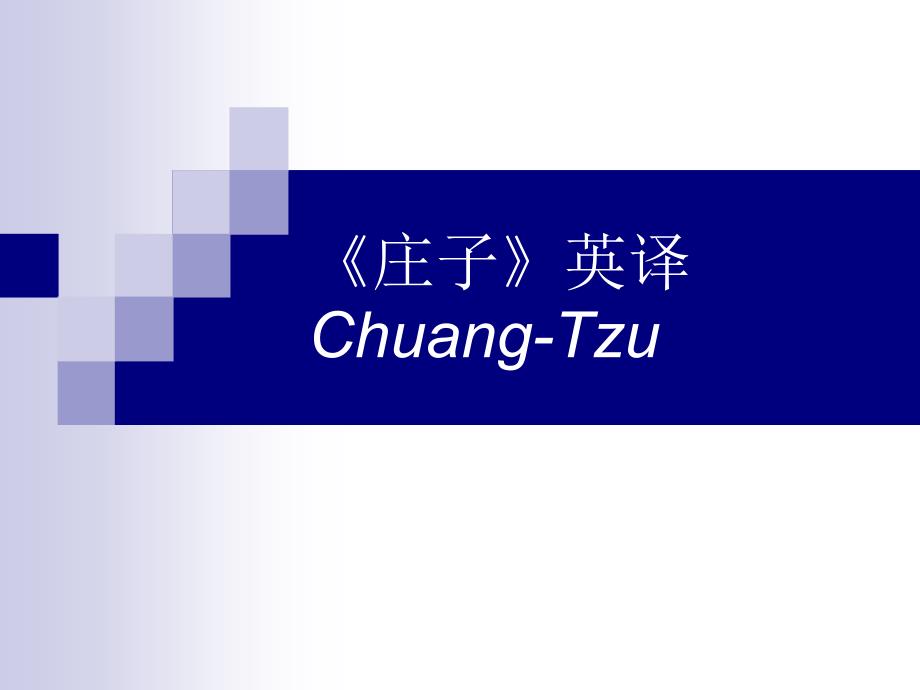 《庄子》英译Chuang-Tzu
《庄子》英译Chuang-Tzu



《《庄子》英译Chuang-Tzu》由会员分享,可在线阅读,更多相关《《庄子》英译Chuang-Tzu(40页珍藏版)》请在装配图网上搜索。
1、庄子英译Chuang-TzunABriefIntroductionofChuang-TzunTheEnglishTranslationofChuang-TzunAComparativestudyofdifferentversionsoftheTranslationofChuang-TzuZhuang ZiZhuangZi(orChuangTzu,c.369286B.C.),withhisgivennameasZhou,wasakeyfigureofTaoismfollowingLaoZi.HewasbornatthetownofMeng(Northeastofthepresent-daySha
2、ngqiu,HenanProvince)oftheSongState.Heonceworkedasanofficialinavarnishtreefarm(漆园吏)beforeresigningtoleadareclusivelife.nZhuangZipennedthefirstseven“inner”chaptersandhisdisciplesandotherthinkerscontributedtheotherparts(the“outer”and“miscellaneous”chapters).SimilartoLaoZisphilosophy,ZhuangZibelievedtha
3、tthe“Tao”istheoriginofeverythingintheuniverse.However,the“Tao”ZhuangZireferedtoisanomnipresentandinfiniteconceptexistinginnature.nThebookbearinghisnamehas33chapterssurvived.ThetraditionalviewisthatZhuangZitransformedLaoZisoutlookonlifeintoaspiritualrealmofabsolutefreedom,a“freeandeasywondering”state
4、.Thisstatecanbeachieved,accordingtoZhuangZi,throughavarietyofcomplicatedintrospectiveexperiencesratherthanpursuingendlessdesiresinsociety.Theexperienceof“xinzhai(心斋,mind-fasting)”meansthefreedomfromallpreoccupations,thatis,anattitudefreefrommaterialismandacompleteunitywithnature.n“心斋”说,是庄子在人间世中借由孔子答
5、复颜回的问话而阐发出来的:“若一志,无听之以耳而听之以心,无听之以心而听之以气。听止于耳,心止于符。气也者,虚而待物者也。唯道集虚。虚者,心斋也。”“斋”,在中国古已有之,其情势有沐浴、不饮酒、不茹荤、不闻舞乐、不近女色等,但这只是外在情势上的斋,属“祭祀之斋”,庄子在此提出的“心斋”,是内在深层意义上的“斋”。从庄子的全部哲学思想来看,“心斋”是一个很重要的领域,亦是体“道”的方法之一。“道”是老子思想的核心,是天地万物的本原。庄子继承和发展了老子的思想,认为“道”的本性是“虚”和“通”。“心斋”的终极目标就是与道合一,即“道通为一”。nBycomparingthesophisticated
6、andcompetitivesocialrealitywiththeharmoniousandtranquilnature,ZhuangZiputforwardthenotionof“wuhua”(thetransformationofthings)andappealedtothereturnofonessuppressedsoulbacktonature.nZhuangZisphilosophyofworshippingthenatureoftenleadstothepursuitofapersonalityofaloofness.Thephilosophicalbasisofthisalo
7、ofnessisrelativism,thatis,inhisownwords,“TheuniverseandIcameintobeingtogether;IandeverythingthereinareOne.”(天地与我并生,而万物与我为一)Onlythroughtheequivalenceofallthingscanonesrealselffuseintotheworld,thusthespiritualemancipationofhumanitycanbeachieved.Zhuang ZinZhuangZi,composedof52sections,ofwhich33areextan
8、t,isaphilosophicalworkbyZhuangZiandhispupilsaswellasbyscholarsoflatergenerations.Itisdividedintothe“InnerChapters”whichhas7sections,the“OuterChapters”whichcontains15sectionsandthe“MiscellaneousChapters”whichconsistsof11sections.nTheideologicalcoreofZhuangZiisitspursuitforabsolutespiritualfreedomfeat
9、uredbycompletetranscendencyanddetachment.ItisgenerallyrecognizedasanimportantmasterpieceoftheTaoistschoolfollowingLaoZi.Intermsofliteraryvalueandartisticachievement,ZhuangZiranks,foritsuniqueartisticstyle,abovealltheprosaicwritingsbyothergreatmastersofthetime.nZhuangZiisadeptatusinglivelyimageriesan
10、dtight-knitallegoricalstoriestoilluminateabstractandprofoundphilosophicalconcepts.Byintegrating,harmoniously,literaturewithphilosophy,ZhuangZiturnsabstrusephilosophicalideasintovisualandinterestingimageries.nRichinimagination,originalinideation,boldinexaggerationandprofoundinconception,“NineteenAlle
11、gories”inZhuangZistrikesthereaderwithapowerfulandcharmingartisticappeal.ZhuangZiisvariedandcolorfulinlanguageuse,novelinsentenceformationandsuperbindiction,seekinganinherentrhythemandanoccasionaluseofcramboswithouttheaffectedpursuitofformalornaments.nBeitfunorjoy,angerorabuse,ZhuangZiturnsthemallint
12、owell-presentedpiecesofprosewithrichsentimentandpowerfulemotion.Takenasawhole,ZhuangZipresentsastyleofgrandeurandeaseandahueofgorgeousnessandmagnificence.ZhuangZinotonlyprovidesprosewritersoflatergenerationswithabundantartisticnutrientsbutalsonurturesthegerminationofancientChinesefictionwithitsmythi
13、callegendsandallegoricaltales.英译概况-全译本1.英国人巴尔福(FredericH.Balfour)的TheDivineClassicofNan-hua:BeingtheWorksofChuangTsze,TaoistPhilosopher,出版于1881年。南华真经道家哲学家庄子的著作(误译)l翟理斯英语世界中研究庄子最早,翻译庄子全集的第一人。ChuangTzu:Mystic,Moralist,andSocialReformer,1889年。ChuangTzu,TaoistPhilosopherandChineseMystic.1926年再版。l理雅格1891
14、年,TheWritingsofKwang-KauTheSacredBooksoftheEast(ed.F.MaxMuller)4.威厄译本,庄子20世纪第一个英语全译本,1963纽约出版,TheSayingsofChuangChou.5.沃兹生(BurtonWatson),1964庄子菁华(ChuangTzu:BasicWritings)1968年,TheCompleteWorksofChuangTzu.6.梅维恒(VictorH.Mair),1994年出版的译本WanderingontheWay:EarlyTaoistTalesandParablesofChuangTzu(逍遥游:庄子中的早
15、期道家故事及寓言)7.汪榕培英译Zhuangzi出版社:湖南人民出版社,1999年摘译本1.1926年,冯友兰受燕京大学的美籍教授博晨光(LuciusChapinPorter)邀请,在北京的“华语学校”开了一门课,为一些来华的外国人讲庄子。华语学校是居住在北京的外国人,为了学习中国,了解中国文化而自办的一所学校。这门课的读本,就是后来的冯友兰庄子英译本ATaoistClassicChuang-Tzu。1931年商务印书馆出版。n英国汉学家韦利(ArthurWaley)的庄子译文收在古代中国的三种思想(ThreeWaysofThoughtinAncientChina,1939)一书中,虽然只有不
16、多几篇,但质量上乘。3.LinYutangTheChuang-tzu英译庄子“IntroductiontoChuangtse:MysticandHumorist”4.EarnestRichardHughes,1942,London:J.M.Dent&SonsLtd,ChinesePhilosophyinClassicalTimes5.陈荣捷(Wing-tsieChan)的少量摘译。1963年普林斯顿大学出版社ASourceBookinChinesePhilosophy.6.冯家福和JaneEnglish合译Chuang-Tzu:TheInnerChapters,1974,兰登书屋。7.葛瑞汉(
17、A.C.Graham),1981,Chuang-Tzu:TheInnerChapters8.克里瑞1991年,道义要书包括道德经全文和庄子内篇。逍遥游n“FreeandEasyWandering”-沃兹生将庄子开篇逍遥游nHsiao-yaoYu,or“EnjoymentinUntroubledEase”.LeggenExcursionsintoFreedom(E.A.Hughes)n1993年克里雷(ThomasCleary)在自己的译本中则仅用“Freedom”一词。nWanderinginAbsoluteFreedom(汪榕培)nTheHappyExcursion(冯友兰)nAHappyE
18、xcursion(林语堂)与物为春n仲尼曰:“死生存亡,穷达贫富,贤与不肖毁誉,饥渴寒暑,是事之变(1),命之行也(2);日夜相代乎前,而知不能规乎其始者也(3)。故不足以滑和(4),不可入于灵府(5)。使之和豫(6),通而不失于兑(7);使日夜无隙而与物为春(8),是接而生时于心者也(9)。是之谓才全。”(德充符)n(1)事之变:人事的变化。(2)命之行:天命的运行。(3)规,度,测度。始,由来。(4)滑(g):乱,和:指德之所以为德的和谐状态。(5)灵府:心灵之府。(6)和:顺,豫:乐。(7)兑,偏悦,喜悦。(8)隙:空隙。(9)接:指与外物事变相接触,时:时中的时,生时于心:指心中有其权
19、。n孔子说:“生死存亡,贫穷富贵,赞贤与毁不肖,饥渴冷暖,这都是事物的变化,天命的运行。犹如日夜轮转,而智慧不能测度它们的起始,因此,不值得以此扰乱德之为德的德性,不可以侵入心灵。使心境和谐快乐;畅通而不失其怡悦,使自己日夜一刻不停地和万物共处在象春天一样的和乐之中。这样,顺应外物而在心中产生的和悦的气质,就叫做才全。n其中“与物为春”是一个非常诗意的表达,对此翟理斯的翻译是:liveinpeacewithmankind,冯友兰的翻译是:bekindwiththings。沃兹生认为他们的翻译没有表达出原文的意象,让人感觉到庄子使用的是“陈腔滥调”(cliches),而实际上,庄子使用语言的方式
20、是前无古人的。华兹生将这句话译成:makeitbespringwitheverything,以诗译诗,堪称后来居上。至人无己,神人无功,圣人无名n夫列子御风而行(15),伶然善也(16),旬有五日而后反(17)。彼于致福者(18),未数数然也。此虽免乎行(19),犹有所待者也(20)。若夫乘天地之正(21),而御六气之辩(22),以游无穷者(23),彼且恶乎待哉(24)!故曰:至人无己(25),神人无功(26),圣人无名(27)。(15)列子:列御寇,郑人,春秋时期思想家。庄子多引列子的言论来证实自己的观点。吕氏春秋不二)说:“子列子贵虚。”可见为道家先驱人物。御:驾驭。列子御风而行:指御风是
21、有待的。(16)泠(lng)然:轻妙的样子。(17)旬:十天。有:又。反:通返。(18)致福:求福。(19)负:避免。行:步行。(20)待,凭借,依靠。庄子书中的有待是哲学范畴,指的是事物的条件性。(21)乘:因。天地:指万物,正:本性。(22)御:本义为驾驭,引伸为顺从、顺应。六气:指阴、阳、雨、风、晦、明。辩:通变,指变化。(23)无穷者:无穷尽的境界。(24)恶(w):何,什么。(25)至人,指思想道德达到最高境界的人。田子方有“得至美而游乎至乐,谓之真人。”天下有“不离于真,谓之至人。”无己:忘掉自己,清除物我界限。(26)神人:庄子理想中得道而神妙莫侧的人。无功:不追求功名。(27)
22、圣人,道德智能高尚的人。庄子认为,只有至人、真人、神人、圣人才是无侍的,才能达到绝对的自由。无名:不迫求名声。nNow Liehtse could ride upon the wind.Sailing happily in the cool breeze,he would go on for fifteen days before his return.Among mortals who attain happiness,such a man is rare.Yet although Liehtse could dispense with walking,he would still have
23、 to depend upon something.nAs for one who is charioted upon the eternal fitness of Heaven and Earth,driving before him the changing elements as his team to roam through the realms of the Infinite,upon what,then,would such a one have need to depend?Thus it is said,“The perfect man ignores self;the di
24、vine man ignores achievement;the true Sage ignores reputation.”By Lin Yutang nTherefore,itissaidthattheperfectmanhasnoself;thespiritualmanhasnoachievement;thetruesagehasnoname.ByFengYoulanTherefore,itissaid,“theperfectmanhasno(thoughtof)self;thespirit-likeman,noneofmerit;thesagely-mindedman,noneoffa
25、me.ByLegge庄周梦蝶又称周公梦蝶庄生晓梦n昔者庄周梦为蝴蝶,栩栩然蝴蝶也。自喻适志与!不知周也。俄然觉,则蘧蘧然周也。不知周之梦为蝴蝶与?蝴蝶之梦为周与?周与蝴蝶则必有分矣。此之谓物化。(庄子齐物论)n喻:通“愉”,愉快n适志:合乎心意,心情愉快。n觉(ju):醒来。n蘧(q):蘧,原意为惊喜的样子,此处为惊疑动容的样子。n分:区分、区别。n物化:事物自身的变化。此处意思为,外部事物都会与自身交合的,即,万事万物最后都是要合而为一的,指大道时而化为庄周,时而化为蝴蝶。庄周梦蝶n庄周梦蝶,典出庄子齐物论,是战国时期道家学派主要代表人物庄子所提出的一个的哲学命题。在其中,庄子运用浪漫的想象
26、力和美妙的文笔,通过对梦中变化为蝴蝶和梦醒后蝴蝶复化为己的事件的描述与探讨,提出了人不可能确切的区分真实与虚幻和生死物化的观点。虽然故事极其短小,但由于其渗透了庄子诗化哲学的精义,成为了庄子诗化哲学的代表。也由于它包含了浪漫的思想情感和丰富的人生哲学思考,引发后世众多文人骚客的共鸣,成为了他们经常吟咏的题目,而最著名的莫过于李商隐所言“庄生晓梦迷蝴蝶,望帝春心托杜鹃”。nOnceuponatime,I,ChuangChou18,dreamtIwasabutterfly,flutteringhitherandthither,toallintentsandpurposesabutterfly.Iw
27、asconsciousonlyofmyhappinessasabutterfly,unawarethatIwasChou.SoonIawaked,andthereIwas,veritablymyselfagain.NowIdonotknowwhetherIwasthenamandreamingIwasabutterfly,orwhetherIamnowabutterfly,dreamingIamaman.Betweenamanandabutterflythereisnecessarilyadistinction.Thetransitioniscalledthetransformationofm
28、aterialthings.nLinyutangExercisen“泉涸,鱼相与处于陆,相呴以湿,相濡以沫,不如相忘于江湖。与其誉尧而非桀也,不如两忘而化其道”。庄子大宗师nWhentheponddriesupandthefishesareleftuponthedryground,ratherthanleavethemtomoisteneachotherwiththeirdampandspittleitwouldbefarbettertoletthemforgetthemselvesintheirnativerivers-andlakes.Anditwouldbebetterthanprais
29、ingYaoandblamingChiehtoforgetboth(thegoodandbad)andloseoneselfinTao.n吾生也有涯(1),而知也无涯(2)。以有涯随无涯(3),殆已(4);已而为知者(5),殆而已矣。为善无近名(6),为恶无近刑(7)。缘督以为经(8),可以保身(9),可以全生(10),可以养亲(11),可以尽年(12)。养生主注释(1)生:生命。涯:一作崖,极限,边际。(2)知:通智,智慧,知识。(3)随:犹逐,追随、追求。逐即逐物,即天下中的“逐万物而下反”。(4)殆:通怠,疲倦。已:助词,通了。(5)已:此。而:还。为:从事,求。为知:追求知识。(6)为
30、:做。名:名利。(7)刑:刑戮。(8)缘:因,顺行。督:中,中道。经:常法。缘督以为经:因顺着名刑之间的自然之道做为养生的常法,达到“得其环中,以应无穷”的宗旨。(9)保身:保全身躯,免遭刑戮。10)全生:生通性,保全自己的天性,免受思虑之苦。(11)养亲:事养父母。庄子此观点与盂子说的“事孰为大?事亲为大。守孰为大?守身为大,不失其身而能事其亲者,有矣,未有失其身而能事其亲者也”相类似。有训亲为精神或训亲为身者非。(12)尽年:指享尽天年,保持自然的寿命而不使年寿夭折。n我们的生命是有限的,而知识是无限的。要想用有限的生命去追求无限的知识,就会很疲倦了。明知如此,仍要汲汲以求地追求知识,那就
31、会更疲倦了。做善事不能有求名利之心,做恶事不能有刑戮之若,顺着刑名之间的自然之道以为常法,就可以保全身躯,保全天性,奉养双亲,享尽天年了。nHumanlifeislimited,butknowledgeislimitless.Todrivethelimitedinpursuitofthelimitlessisfatal;andtopresumethatonereallyknowsisfatalindeed!Indoinggood,avoidfame.Indoingbad,avoiddisgrace.Pursueamiddlecourseasyourprinciple.Thusyouwillgu
32、ardyourbodyfromharm,preserveyourlife,fulfilyourdutiesbyyourparents,andliveyourallottedspanoflife.(Lin)n井蛙不可以语于海者,拘于虚也;夏虫不可以语于冰者,笃于时也;曲士不可以语于道者,束于教也。nYoucannotspeakofoceantoawell-frog,whichislimitedbyhisabode.Youcannotspeakoficetoasummerinsect,whichislimitedbyhisshortlife.YoucannotspeakofTaotoapedago
33、gue,whoislimitedinhisknowledge.Butnowthatyouhaveemergedfromyournarrowsphereandhaveseenthegreatocean,youknowyourowninsignificance,andIcanspeaktoyouofgreatprinciples.nAutumn FloodsnInthetimeofautumnfloods,ahundredstreamspouredintotheriver.Itswelledinitsturbidcourse,sothatitwasimpossibletotellacowfroma
34、horseontheoppositebanksorontheislets.ThentheSpiritoftheRiverlaughedforjoythatallthebeautyoftheearthwasgatheredtohimself.Downthestreamhejourneyedeast,untilhereachedtheNorthSea.There,lookingeastwardsandseeingnolimittoitswideexpanse,hiscountenancebegantochange.Andashegazedovertheocean,hesighedandsaidto
35、North-SeaJo,Avulgarproverbsaysthathewhohasheardagreatmanytruthsthinksnooneequaltohimself.AndsuchaoneamI.FormerlywhenIheardpeopledetractingfromthelearningofConfuciusorunderratingtheheroismofPoYi,Ididnotbelieveit.ButnowthatIhavelookeduponyourinexhaustibility-alasforme!hadInotreachedyourabode,Ishouldha
36、vebeenforeveralaughingstocktothoseofgreatenlightenment!nTothisNorth-SeaJo(theSpiritoftheOcean)replied,Youcannotspeakofoceantoawell-frog,whichislimitedbyhisabode.Youcannotspeakoficetoasummerinsect,whichislimitedbyhisshortlife.YoucannotspeakofTaotoapedagogue,whoislimitedinhisknowledge.Butnowthatyouhav
37、eemergedfromyournarrowsphereandhaveseenthegreatocean,youknowyourowninsignificance,andIcanspeaktoyouofgreatprinciples.nThereisnobodyofwaterbeneaththecanopyofheavenwhichisgreaterthantheocean.Allstreamspourintoitwithoutcease,yetitdoesnotoverflow.ItisbeingcontinuallydrainedoffattheTail-Gate65yetitisneve
38、rempty.Springandautumnbringnochange;floodsanddroughtsareequallyunknown.Andthusitisimmeasurablysuperiortomereriversandstreams.YetIhaveneverventuredtoboastonthisaccount.ForIcountmyself,amongthethingsthattakeshapefromtheuniverseandreceivelifefromtheyinandyang,butasapebbleorasmalltreeonavastmountain.Onl
39、ytooconsciousofmyowninsignificance,howcanIpresumetoboastofmygreatness?nArenottheFourSeastotheuniversebutlikeant-holesinamarsh?IsnottheMiddleKingdomtothesurroundingoceanlikeatare-seedinagranary?Ofallthemyriadcreatedthings,manisbutone.AndofallthosewhoinhabittheNineContinents,liveonthefruitoftheearth,a
40、ndmoveaboutincartandboat,anindividualmanisbutone.Isnothe,ascomparedwithallcreation,butasthetipofahairuponahorsesbody?nThesuccessionoftheFiveRulers66,thecontentionsoftheThreeKings,theconcernsofthekind-hearted,thelaborsoftheadministrators,arebutthisandnothingmore.PoYirefusedthethroneforfame.Chungni(Confucius)discoursedtogetareputationforlearning.Thisover-estimationofselfontheirpart-wasitnotverymuchlikeyourownpreviousself-estimationinreferencetowater?
- 温馨提示:
1: 本站所有资源如无特殊说明,都需要本地电脑安装OFFICE2007和PDF阅读器。图纸软件为CAD,CAXA,PROE,UG,SolidWorks等.压缩文件请下载最新的WinRAR软件解压。
2: 本站的文档不包含任何第三方提供的附件图纸等,如果需要附件,请联系上传者。文件的所有权益归上传用户所有。
3.本站RAR压缩包中若带图纸,网页内容里面会有图纸预览,若没有图纸预览就没有图纸。
4. 未经权益所有人同意不得将文件中的内容挪作商业或盈利用途。
5. 装配图网仅提供信息存储空间,仅对用户上传内容的表现方式做保护处理,对用户上传分享的文档内容本身不做任何修改或编辑,并不能对任何下载内容负责。
6. 下载文件中如有侵权或不适当内容,请与我们联系,我们立即纠正。
7. 本站不保证下载资源的准确性、安全性和完整性, 同时也不承担用户因使用这些下载资源对自己和他人造成任何形式的伤害或损失。
